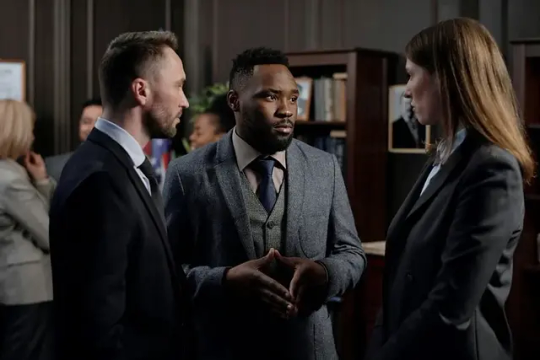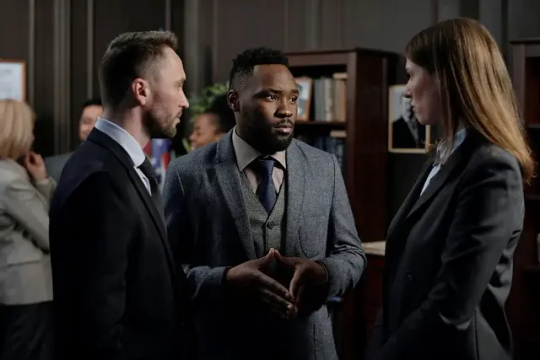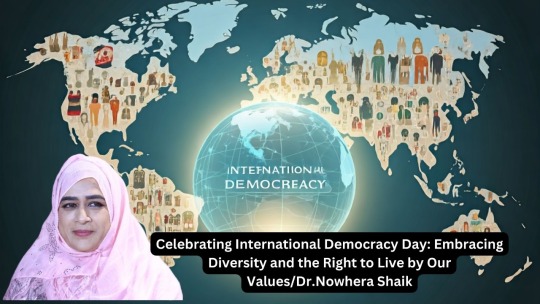#civiceducation
Explore tagged Tumblr posts
Text

Political apathy is a growing challenge, especially among conservative voters 📊. But it doesn't have to be this way! In this post, we dive into practical strategies to reignite civic engagement, from fostering meaningful conversations 🗣️ to utilizing modern tools like social media platforms 📱 for outreach. By educating and empowering voters, we can bridge the gap and ensure that every voice counts in shaping our future
🗳️💪. Let's come together to inspire action and boost voter turnout!
#PoliticalEngagement#ConservativeVoters#VoterTurnout#CivicDuty#PoliticalApathy#InformedVoters#SocialMediaCampaign#Election2024#CivicEducation#GetOutTheVote
1 note
·
View note
Text

Political apathy is a growing challenge, especially among conservative voters 📊. But it doesn't have to be this way! In this post, we dive into practical strategies to reignite civic engagement, from fostering meaningful conversations 🗣️ to utilizing modern tools like social media platforms 📱 for outreach. By educating and empowering voters, we can bridge the gap and ensure that every voice counts in shaping our future
🗳️💪. Let's come together to inspire action and boost voter turnout!
#PoliticalEngagement#ConservativeVoters#VoterTurnout#CivicDuty#PoliticalApathy#InformedVoters#SocialMediaCampaign#Election2024#CivicEducation#GetOutTheVote
0 notes
Text
Understanding the Electoral College: How Delegates Shape Our Vote
On November 5th, Americans will cast votes not for a president, but for delegates representing their states. This video clarifies the Electoral College process and its significance in shaping presidential elections. Discover how your vote is part of a larger system! #ElectoralCollege #PresidentialElection #VotingProcess #AmericanPolitics #Delegates #CivicEducation #Election2024…
#AmericanPolitics#CivicEducation#Delegates#Election2024#ElectoralCollege#PoliticalSystem#PresidentialElection#UnderstandingDemocracy#VoteSmart#VotingProcess
0 notes
Text

#interestingfacts 83
Follow me for more interesting facts and what’s trending around the world 🌍
#interestingfacts#AmericanFlag#HistoryFacts#BobHeft#Patriotism#FlagDesign#USAHistory#NationalPride#SymbolOfFreedom#CivicEducation#HistoricalFigures
0 notes
Text
Celebrating International Democracy Day: Embracing Diversity and the Right to Live by Our Values/Dr.Nowhera Shaik

Introduction
Imagine a world where every individual has the freedom to live according to their values, where, economic, political, and cultural differences are celebrated rather than suppressed. This vision is at the heart of International Democracy Day, a day dedicated to promoting and upholding the principles of democracy worldwide. In this article, we will explore the significance of International Democracy Day, the importance of diversity, and the inspiring story of Dr. Nowhera Shaik, the founder and CEO of the Heera Group of Companies, who embodies the spirit of democratic values.
The Essence of International Democracy Day
What is International Democracy Day?
International Democracy Day, observed on September 15th, was established by the United Nations in 2007 to promote and uphold the principles of democracy. It serves as a reminder of the importance of democratic governance and the need to protect and promote human rights, freedom, and equality.
Why Celebrate Democracy?
Democracy is more than just a political system; it is a way of life that empowers individuals to participate in decision-making processes, express their opinions, and live according to their values. Celebrating democracy means recognizing the inherent dignity and worth of every person, regardless of their background or beliefs.
Embracing Social, Economic, Political, and Cultural Differences
Social Differences: A Tapestry of Human Experience
Social differences, such as ethnicity, religion, and gender, contribute to the rich tapestry of human experience. Embracing these differences fosters a more inclusive and harmonious society. For example, multicultural festivals and events provide opportunities for people to learn about and appreciate diverse cultures.
Economic Differences: Bridging the Gap
Economic disparities can pose significant challenges to achieving true democracy. Addressing these differences requires policies that promote economic justice and equal opportunities for all. Initiatives like microfinance programs and social enterprises can help bridge the economic gap and empower marginalized communities.
Political Differences: The Heart of Democracy
Political differences are the essence of a vibrant democracy. Healthy debates and diverse viewpoints are crucial for the development of sound policies and governance. Encouraging political participation and protecting the right to dissent are fundamental to maintaining a democratic society.
Cultural Differences: Celebrating Diversity
Cultural differences enrich our lives and broaden our perspectives. Celebrating cultural diversity through art, music, literature, and cuisine fosters mutual respect and understanding. Cultural exchange programs and international collaborations can further promote global harmony.
The Right to Live by Our Values
Personal Freedom and Autonomy
At the core of democracy is the right to live according to one's values. This includes the freedom to make personal choices, pursue one's passions, and express one's identity. Protecting these rights ensures that individuals can lead fulfilling and meaningful lives.
The Role of Education
Education plays a crucial role in promoting democratic values and empowering individuals to live by their values. By fostering critical thinking, empathy, and respect for diversity, education can help build a more just and equitable society.
Dr. Nowhera Shaik: A Beacon of Democratic Values
The Journey of Dr. Nowhera Shaik
Dr. Nowhera Shaik, the founder and CEO of the Heera Group of Companies, is a remarkable example of someone who embodies democratic values. Born in a conservative family, Dr. Shaik faced numerous challenges in her pursuit of education and entrepreneurship. However, her determination and resilience enabled her to overcome these obstacles and achieve remarkable success.
Empowering Women and Marginalized Communities
Dr. Shaik's journey is not just a personal triumph; it is a testament to the power of democracy to uplift and empower individuals. Through the Heera Group, she has created numerous opportunities for women and marginalized communities, providing them with the tools and resources to achieve economic independence and social empowerment.
Advocating for Social Justice
Dr. Shaik is also a vocal advocate for social justice and human rights. Her philanthropic initiatives, such as educational scholarships and healthcare programs, have made a significant impact on the lives of many. Her work exemplifies the democratic principles of equality, justice, and compassion.
Conclusion
International Democracy Day is a celebration of the values that unite us as human beings: freedom, equality, and the right to live according to our values. By embracing social, economic, political, and cultural differences, we can build a more inclusive and harmonious world. The inspiring story of Dr. Nowhera Shaik reminds us of the transformative power of democracy and the importance of empowering individuals to achieve their full potential. As we celebrate International Democracy Day, let us recommit to upholding democratic values and working towards a more just and equitable society for all.
"Democracy is not just the right to vote; it is the right to live in dignity." - Dr. Nowhera Shaik
For more information on International Democracy Day, visit the United Nations website.
By celebrating International Democracy Day and embracing the diversity that makes us unique, we can create a world where everyone has the opportunity to live a life of dignity and purpose.
#internationaldemocracyday#democracy#globalcitizenship#humanrights#politicalfreedom#civicengagement#socialequality#culturaldiversity#drnowhera#heeragroup#democraticvalues#politicalsystems#civiceducation#globalaffairs#politicalparticipation#individualrights#economicfreedom#democraticinstitutions#worlddemocracy#freedomofchoice
0 notes
Text
Its Easier to Take YOUR Away Rights…
Imagine trying to play a game where you don’t know the rules. No one told you how to win or what moves are allowed, yet you’re expected to compete. Sounds frustrating, right? This is what it feels like when you’re expected to navigate life without knowing your rights. The less you know, the easier it is for those in power to manipulate the outcome. Unfortunately, this analogy hits close to home for many in the UK, as our education system often falls short in teaching students about their rights.
In many schools across the UK, education on rights and government the study of our legal system, democratic principles, and the rights guaranteed under UK law is sorely lacking. I only learn what I know by reading. Students might learn about Parliament, the role of the Prime Minister, or the basics of democracy, but how often do they delve into the specifics of the Human Rights Act, the Equality Act, or civil liberties? Rarely do they engage in discussions about their right to protest, their right to privacy, or protections against discrimination. Oh, how can I forget to mention freedom of speech
Even fewer students leave school with a deep understanding of how these rights apply to their everyday lives.
History shows us time and again that the erosion of rights often begins with ignorance. As the English poet Thomas Gray in his 1742 Ode on a Distant Prospect of Eton College once “said In knowing nothing, life is most delightful" In other words Ignorance Is bliss. For example, in the early 20th century, women in the UK fought tirelessly for their right to vote, a right that many took for granted once it was achieved. Yet even today, voter apathy remains high, particularly among young people, many of whom are unaware of how crucial their participation is in shaping society.
The UK has seen a steady expansion of state surveillance powers in recent years, particularly through laws like the Investigatory Powers Act 2016 (the "Snooper's Charter"). These measures were introduced with little public outcry, in part because many people didn’t fully understand their right to privacy under Article 8 of the European Convention on Human Rights. Had there been greater awareness of these rights, there might have been stronger resistance to such sweeping changes.
The Consequences of an Uninformed Public
When people don’t know their rights, they are less likely to stand up for themselves when those rights are violated. This is the main reason I become a Justice FreeSpeech Advocate. The Government overreach, unlawful surveillance, censorship, discrimination—these are all easier to justify when the population is unaware of the limits placed on authority by the law.
I recommend that you watch the video on YouTube called “What the Government isn’t telling you about facial recognition” By Big Brother Watch It’s a eye opener for those who was still not “awake” yet.
Moreover, a lack of civic education leads to disengagement. If you don’t understand how the government works or what your rights are, why would you feel compelled to vote, participate in protests, or engage in your community? This disengagement serves those in power by making it easier to pass policies that benefit the few at the expense of the many.
To protect our rights, we must first understand them. That means bringing rights education back to the forefront in our schools. it’s essential to foster a culture of curiosity and awareness. Rights are not static they can be expanded or diminished depending on public action (or inaction).
When these rights are ignored or downplayed in education, it creates a vulnerable population that is less equipped to protect itself against overreach and injustice. The lack of knowledge around these rights often leads to apathy, allowing erosion of protections that were hard-fought for by previous generations. Understanding our rights is the first step in protecting them, ensuring that we can participate fully and equally in society.
Ultimately, the protection of our rights depends on us. We can’t wait for someone else to teach us; we must seek out this knowledge ourselves and demand that our educational systems equip future generations with the tools they need to understand and protect their rights. Because when we know our rights, we become powerful, and a powerful, informed public is the cornerstone of any thriving democracy.
#HumanRights#CivicEducation#KnowYourRights#UKPolitics#Democracy#PrivacyRights#CivilLiberties#EducationReform#GovernmentOverreach#FreedomOfSpeech#EqualityAct#HumanRightsAct#StateSurveillance#YouthEngagement#ProtestRights#VoterApathy#SocialJustice#FacialRecognition#PublicAwareness#DemocraticParticipation#today on tumblr#deep thoughts#new blog
0 notes
Text
Empowering Citizens: The Crucial Role of Civic Education in Building Informed and Engaged Societies

Civic education stands as a cornerstone in nurturing informed, responsible, and active citizens, essential for the vitality of democratic societies. It encompasses the knowledge, skills, and values that empower individuals to participate effectively in civic life. This comprehensive exploration delves into the importance, key components, challenges, and future considerations of Citizen Education, shedding light on its pivotal role in shaping the citizens of tomorrow.
The Importance of Civic Education
1. Foundations of Democracy
Citizen Education is foundational to the principles of democracy. It equips individuals with an understanding of democratic values, rights, and responsibilities, fostering a sense of civic duty and active participation in the democratic process.
2. Informed Decision-Making
An informed citizenry is essential for the functioning of a democracy. Civic Education provides individuals with the tools to critically analyze information, evaluate sources, and make informed decisions, contributing to a well-informed and discerning public.
3. Civic Engagement and Participation
Citizen Education encourages active participation in civic and community life. It empowers individuals to engage in various forms of civic participation, including voting, community service, advocacy, and contributing to the betterment of society.
4. Social Cohesion and Inclusivity
By promoting an understanding of diverse perspectives and fostering a sense of social cohesion, Citizen Education contributes to building inclusive communities. It encourages respectful dialogue, tolerance, and cooperation among individuals with differing backgrounds and beliefs.
5. Responsible Global Citizenship

In an interconnected world, Civic Education extends beyond national boundaries. It cultivates a sense of global citizenship, emphasizing the interconnectedness of global issues and the responsibility of individuals to contribute to positive change on a global scale.
Key Components of Citizen Education
1. Understanding Democratic Principles
Civic education begins with an exploration of democratic principles, including the rule of law, individual rights, equality, and the separation of powers. It provides a foundation for individuals to comprehend the structures and values underpinning democratic societies.
2. Knowledge of Government Structures
An essential component of Citizen Education involves imparting knowledge about government structures, both at the local and national levels. This includes an understanding of the legislative, executive, and judicial branches, as well as the roles of elected officials.
3. Critical Thinking and Media Literacy
Citizen Education emphasizes critical thinking skills and media literacy. Individuals are taught to critically evaluate information, discern bias, and navigate the media landscape, enabling them to make well-informed decisions and participate in public discourse.
4. Rights and Responsibilities
Individuals need to be aware of their rights and responsibilities as citizens. Citizen Education instills an understanding of the rights guaranteed by constitutions and legal frameworks, along with the responsibilities that come with being an active participant in society.
5. Community and Global Awareness
Citizen Education goes beyond the individual and fosters awareness of the community and global contexts. It encourages individuals to understand the challenges and opportunities facing their communities and the interconnectedness of global issues.
6. Civic Skills Development
Practical skills are integral to Civic education. This includes communication skills, conflict resolution, community organizing, and the ability to engage in civil discourse. These skills empower individuals to actively contribute to civic life.
7. Ethical Decision-Making
Citizen Education places a strong emphasis on ethical decision-making. Individuals are guided in understanding ethical considerations in civic life, including issues related to justice, equity, and the common good.
8. Civic Action and Advocacy
Empowering individuals to translate knowledge into action is a key goal of Citizen Education. It encourages civic action, community service, and advocacy, enabling individuals to be agents of positive change within their communities.
Challenges in Citizen Education
1. Limited Inclusion in Curricula
Citizen Education is not universally prioritized in educational curricula. Limited time and resources are allocated to this crucial subject, leading to variations in the depth and breadth of Citizen Education across educational institutions.
2. Digital Information Landscape
The digital age presents challenges in navigating the vast information landscape. Civic education must address the prevalence of misinformation, and disinformation, and the need for enhanced media literacy to equip individuals with the skills to discern reliable sources.
3. Cultural and Political Sensitivities
Citizen Education may encounter challenges related to cultural and political sensitivities. Balancing diverse perspectives and addressing controversial issues in a way that respects differing viewpoints is a delicate aspect of Citizen Education.
4. Teacher Preparedness

Effective Citizen Education relies on well-prepared educators who can facilitate meaningful discussions and engage students in critical thinking. Ensuring teacher preparedness and ongoing professional development is essential for the success of Citizen Education programs.
5. Societal Inequalities
Inequities within societies can impact access to quality Citizen Education. Ensuring that Citizen Education reaches all segments of society, including marginalized communities, is crucial for building inclusive and participatory democracies.
6. Lack of Civic Engagement Opportunities
Citizen Education is most effective when complemented by opportunities for practical civic engagement. Limited opportunities for students and individuals to apply their knowledge in real-world contexts can hinder the development of active citizenship.
7. Political Polarization
Political polarization within societies can present challenges for Citizen Education. Encouraging respectful dialogue and fostering a sense of shared responsibility becomes more challenging in environments characterized by deep political divisions.
8. Globalization and Diverse Perspectives
The Evolution of Education: Exploring the Benefits and Challenges of K-12 Online Schools

This article delves into the world of K-12 online education, examining its benefits, challenges, and the impact it has on the traditional educational landscape.
Read more:
Future Considerations in Citizen Education
1. Digital and Technological Integration
Embracing digital tools and technology can enhance Citizen Education. Integrating online platforms, interactive resources, and digital simulations can make Civic education more engaging and relevant to the tech-savvy generations.
2. Community Partnerships
Collaboration with community organizations, local governments, and non-profits can strengthen Citizen Education. Community partnerships provide real-world connections, expose individuals to diverse experiences, and create opportunities for civic engagement.
3. Global Citizenship Education
Given the interconnected nature of global challenges, there is a growing need for a focus on global citizenship education. Citizen Education should incorporate a broader perspective, emphasizing the role individuals play in addressing global issues.
4. Project-Based Learning
Implementing project-based learning approaches can make Citizen Education more experiential. Encouraging students to undertake community projects, engage in service learning, and address real-world issues enhances the practical application of civic knowledge.
5. Inclusive and Culturally Relevant Approaches
Civic education should be inclusive and culturally relevant, acknowledging diverse perspectives and histories. Incorporating local context and narratives ensures that Citizen Education resonates with the experiences of all individuals within a given society.
6. Emphasis on Social and Emotional Learning
Integrating social and emotional learning (SEL) components into Citizen Education can enhance interpersonal skills, empathy, and resilience. SEL fosters the development of emotionally intelligent and socially aware citizens.
7. Active Youth Participation

Empowering youth to actively participate in civic life is crucial for the future of democracy. Citizen Education should include avenues for youth leadership, encouraging them to voice their opinions, advocate for change, and contribute to societal progress.
8. Continued Research and Evaluation
Ongoing research and evaluation are essential for refining Citizen Education approaches. Studying the impact of Citizen Education programs, identifying best practices, and adapting curricula based on empirical evidence contribute to continuous improvement.
Conclusion
Civic education is a fundamental building block for the development of responsible, informed, and engaged citizens. As societies evolve, Citizen Education must adapt to address emerging challenges, leverage technology, and foster a sense of global responsibility. By prioritizing Citizen Education, societies can ensure the cultivation of active citizens who contribute to the well-being of their communities, participate meaningfully in democratic processes, and collectively shape a future grounded in the principles of justice, equality, and civic responsibility.
#civiceducation#empowercitizens#democracy#GlobalCitizenship#civicengagement#globalawareness#inclusion#Conclusion#civicresponsibility#EngagedCitizens
0 notes
Text
Empowering Citizens:
Unveiling the Foundations of Civics
Empowering Citizens: Unveiling the Foundations of Civics
In our journey through the realm of civics, we embark on a quest to unravel the essential building blocks that shape the dynamics of society, governance, and citizenship. Like seasoned explorers, we shall navigate the terrain of rights, responsibilities, and government structures, equipping ourselves with knowledge that not only informs but empowers.
Defining Civics
At its core, civics is the beacon that guides us through the intricacies of civic life. It's the compass that points us toward understanding our role as citizens within a society. Civics is the study of our rights, the embrace of our responsibilities, and the revelation of our civic duties. But it doesn't stop there. Civics also unveils the inner workings of government, deciphering the mechanisms by which decisions are made and laws are enforced.
Key Concepts Unveiled
Citizenship: As we delve deeper, we encounter the concept of citizenship, a badge of belonging to a particular nation. But this badge is not merely ornamental; it bestows upon us certain privileges and rights. However, citizenship is a two-way street; it demands our active participation, requiring us to obey laws, contribute through taxes, and engage in the democratic process.
Government: The word "government" conjures images of institutions and individuals responsible for maintaining order and providing essential services to society. Yet, it's not a monolith. Governments exist at various levels, from the local playground to the national stage, each with its own role in shaping our lives.
Rights: Imagine a tapestry woven with the threads of liberty, justice, and freedom. These are our rights—legal and moral entitlements that we hold dear. Whether it's the freedom to express our thoughts or the right to a fair trial, these rights are the pillars of a just society, often protected by constitutions and laws.
Responsibilities: With rights come responsibilities. As citizens, we bear the duty of upholding our end of the social contract. Voting in elections, serving on juries, paying taxes, and adhering to the law are just a few examples of the responsibilities that come with the territory of citizenship.
The Power of Civics
But why does civics matter? It matters because it transforms us from passive observers into active participants. Through civics, we become architects of democracy, capable of shaping the world around us. Civics equips us with the tools to not only safeguard our rights but to ensure justice, fairness, and equality in our society. It empowers us to collaborate with others to address communal challenges and appreciate the beautiful tapestry of diverse voices that enrich our democratic tapestry.
As we embark on this journey of discovery, remember that civics is not a distant subject but a practical instrument for becoming an engaged and responsible citizen. In the lessons to come, we shall venture deeper into the intricate web of government structures, the democratic process, and the intricate dance of rights and responsibilities that define the world of civics.
#Civics#Citizenship#Government#RightsAndResponsibilities#Democracy#Education#CommunityEngagement#CivicEducation#Empowerment#Justice#Equality#Diversity#CivicDuty#CivicAwareness
0 notes
Text
Pro Con Controversial Issues

Pro con controversial issues Pro con controversial issues, ProCon.org is a non-profit organization that promotes critical thinking by presenting for and against tips for role-play debates. When making a decision of minor importance, I have always found it advantageous to consider all the pros and cons. Sigmund Freud Learn to think and judge for yourself, responsibly. Don't accept everything without criticism and as absolutely true, everything which is brought to your attention. Learn from life. The biggest mistake of my life was that I believed everything faithfully which came from the top, and I didn't dare to have the least bit of doubt about the truth of that which was presented to me. Walk through life with your eyes open. Don't become one-sided; examine the pros and cons in all matters. Rudolf Hoss Pro and con are opposites, that fact is clearly seen. If progress means to move forward, then what does congress mean? Nipsey Russell If you are trying to take a difficult decision and you're weighing up the pros and cons, you have frank conversations. Everybody knows this in their walk of life. Tony Blair Lincoln had no such person that he could talk with. Often, as a result, he debated with himself, and he would draw up a kind of list of the pros and cons of an argument, and carefully figure them out, and he might test them in public. David Herbert Donald ProCon.org is a nonpartisan website that presents both sides of controversial issues in a straightforward, primarily pro-con format. Its primary goal is to promote critical thinking and educate citizens so they can make informed decisions about important issues. The website provides unbiased information on topics such as the death penalty, gun control, and climate change. Encyclopaedia Britannica ProCon is a valuable resource for teachers to help students become informed about controversial issues. It offers free educational resources that promote critical thinking and civic engagement. This website has an AllSides Media Bias Rating™ of Mixed. This means that it presents a mix of perspectives but may not show all possible perspectives or be perfectly balanced. As of March 2023, people have voted on the AllSides Media Bias Rating for it. On average, those who disagree with the rating think this source has a Center bias. This site is a non-profit organization that promotes critical thinking, education, and informed citizenship by presenting controversial issues in a straightforward, nonpartisan primarily pro-con format. The website serves as an unbiased information source for users by presenting sourced pros and cons of debatable issues, as well as reference information relevant to those issues. ProCon.org's research staff and editors thoroughly research and compile the information presented on the website.

Controversial issues about students The primary goal of this organization is to promote critical thinking and educate citizens so they can make informed decisions about important issues. The website provides users with unbiased information about controversial issues, including lessons aligned to the Common Core State Standards (CCSS) that include role-play debates, political letter-writing, online discussions, and exercises for distinguishing fact from opinion. ProCon.org also trains teachers and provides tools for civic education. It has been recognized for its work by various organizations. It has won several awards for its coverage of U.S. presidential elections since 2008. Additionally, 37 U.S. state governments, 17 U.S. state departments of education, 31 foreign governments, 25 U.S. federal agencies, and thousands of media articles have cited ProCon.org. The style of the website is manly oriented to present controversial issues in a non-partisan style with supporting background information, statistics, and resources. The website is a free educational resource that provides users with unbiased information about controversial issues. Its primary goal is to promote critical thinking and educate citizens so they can make informed decisions about important issues. ProCon.org is sponsored by a nonprofit, nonpartisan public charity. Our presentation structure uses a balanced pro/con format that makes it a go-to source for online research on controversial issues. Teachers can use the site to conduct research on various topics such as the death penalty for a debate or select an issue and write a persuasive speech. The site also includes lessons aligned to the CCSS that promote critical thinking and civic engagement. These lessons include role-play debates, political letter-writing, online discussions, and exercises for distinguishing fact from opinion. ProCon.org is an excellent resource to use for researching pros-cons and controversial topics. It provides questions and information about current popular, controversial issues. The website has been archived by the Library of Congress since 2008.

Health care issues As a matter of fact we are a nonpartisan, nonprofit public charity that provides unbiased information on controversial issues. The website presents sourced pros and cons of debatable issues, as well as reference information relevant to those issues. ProCon.org aims to promote critical thinking and educate citizens so they can make informed decisions about important issues. The website is free and serves more than 20 million people each year, including students and teachers in more than 11,000 schools in all 50 states and 90 countries. Our contents cover more than 50 controversial issues from gun control and death penalty to illegal immigration and alternative energy. The website uses a primarily pro-con format to present the information in a straightforward, nonpartisan way. ProCon.org's primary goal is to reduce the level of deception and confusion in U.S. politics by providing professionally-researched pro, con, and related information on controversial issues. You can also find a Teacher's Corner that provides suggestions for lessons aligned with the Common Core State Standards (CCSS). These lessons include role-play debates, political letter-writing, online discussions, and exercises for distinguishing fact from opinion. Teachers can use ProCon.org as a go-to source for online research on controversial issues. In summary, ProCon.org provides unbiased information on controversial issues using a primarily pro-con format. The website aims to promote critical thinking and educate citizens so they can make informed decisions about important issues. It covers more than 50 controversial issues from gun control and death penalty to illegal immigration and alternative energy. Teachers can use ProCon.org as a go-to source for online research on controversial issues. Our mission is to promote civility, critical thinking, education, and informed citizenship by presenting the pro and con arguments to debatable issues in a nonpartisan format. The organization provides free educational resources that offer non-biased information on controversial issues and promote critical thinking and civic engagement. ProCon.org is a non-biased, non-partisan website that allows people to have open access to information about things that are important to them. The organization's budget, leadership, and mission can be learned through its profile on LA2050.

Pro con issues for citizens Furthermore it provides professionally-researched pro, con, and related information on more than 50 topics. The website presents both sides of debated issues with supporting background information, statistics, and resources. ProCon.org offers fair, free, and unbiased resources that allow millions of people each year to learn new facts and think critically about both sides of controversial topics. The website is a great source for information about polarizing topics where users can learn about both sides of the issues because there is more than one side. ProCon.org is a non-profit organization that provides unbiased information about controversial issues. It aims to promote critical thinking and educate citizens so they can make informed decisions about important issues. ProCon.org offers lesson plans, strategies, videos, and other resources for teaching opposing viewpoints and critical thinking for grades 6-12 and AP courses. The website presents both sides of key social issues such as Obamacare, alternative energy, illegal immigration, gay marriage, and more. ProCon.org is a go-to source for online research on controversial issues. Its balanced pro/con format makes it an excellent resource for teachers who want to familiarize themselves with the site and spend time in the Teacher’s Corner to explore the many suggestions from other educators. Lessons aligned to the CCSS include role-play debates, political letter-writing, online discussions, and exercises for distinguishing fact from opinion. For example: In a government class, students can conduct research on the death penalty for a debate; in a public speaking class, students could select an issue and write a persuasive speech. Our network has reached over 5,000 schools in all 50 states and 66 countries. Educators appreciate ProCon.org's ability to develop critical thinking skills by presenting both sides of key social issues. Teachers can use our website as their antidote to bias so that future generations can be more informed citizens. English teacher Pat Houlton said she has her students use ProCon.org as a starting point for their problem-and-solution essays. The resource can also be useful in the library. There are a lot of success stories of using ProCon.org in the classroom. Teachers have commented that ProCon.org is a great resource to use for persuasive writing where students can get a comprehensive view without the dangers of a “blind” internet search. ProCon.org is also the first place that teachers refer students and staff to for information on issues topics, etc. They do “issues/opinion” research in multiple grades and ProCon.org is their first stop for information. Teachers have directed their students to ProCon.org to get a quick, balanced view of a topic that seemed overwhelming to them, which led to well-informed discussion in the classroom.

Pro con social media We provide lesson plans, strategies, videos, and other resources for teaching opposing viewpoints and critical thinking for grades 6-12 and AP courses. The website has been used by college-level journalism classes as well. Mike Schmoker, best-selling author of Focus and Results Now, lauded ProCon.org saying "Our democracy depends on an informed electorate and ProCon.org plays a vital role educating citizens in a balanced way about a vast number of challenging issues for our nation". Jeff Harris, CEO of the Junior Statesmen of America Foundation said "ProCon.org is an invaluable resource for our students who are learning how to think critically about important issues facing our country". In conclusion, teachers have found success in using ProCon.org as a resource for persuasive writing assignments and issues/opinion research. The website provides lesson plans and resources for teaching opposing viewpoints and critical thinking. College-level journalism classes have also used the website as an educational tool. Experts in education have praised ProCon.org's role in educating citizens about challenging issues facing our nation. You can also try these useful AI websites for debate practice: https://opinionate.io/ Opinionate.io is an AI-powered tool that allows users to debate a chosen topic and have the AI select the winner. It also allows users to generate a controversial topic and have the AI debate it. Very useful for self-improvement. As a matter of fact the debate technique can be a highly effective way to learn a language because it provides opportunities for students to practice using the language in a structured and engaging context. In a real context the debate technique can be very useful because it can encourage critical thinking skills and promote active listening skills; furthermore it can help to build confidence and provide good opportunities for authentic language use, improving communication skills in a meaningful way. https://logicballs.com/tools/question-and-answer-generator Question and answer generator is a type of artificial intelligence technology that can generate questions and answers automatically. This software can be particularly useful for Educational purposes, as well as in Customer Services, when doing Surveys or Job Interviews. You may find still more interesting material for your culture and your entertainment visiting the following pages: AI guide to web resources Web software guide links Blog links and resources English culture guide map Best quotes and aphorisms on AI Best prompts to use with ChatGPT The most interesting articles to read Lots of free books to download Our blog best video quotes 100 best quotes and aphorisms Great and famous philosophy quotes Our blog best visual quotes Essays with quotes Quotes by authors Quotes by arguments Thoughts and reflections News and events Read the full article
#AllSidesMediaBiasRating#awards#Britannica#Centerbias#civiceducation#civicengagement#civility#CommonCoreStateStandards#controversial#controversialissues#criticalthinking#debate#Education#Encyclopaedia#format#freeeducationalresource#informeddecisions#issues#LA2050.#LibraryofCongress#non-profitorganization#nonpartisan#onlineresearch#pro-con#pro-conformat#ProCon.org#School#sitereview#Teacher'sCorner#teachers
0 notes
Video
youtube
Is the American Constitution Outdated? - A Deep Dive
#youtube#Constitution ConstitutionalRights LawAndOrder CivicEducation KnowYourRights Democracy LegalSystem Government BillOfRights CivilLiberties Pol
0 notes
Text

Celebrating International Democracy Day: Embracing Diversity and the Right to Live by Our Values/Dr.Nowhera Shaik
https://princesnowherashaikh.com/celebrating-international-democracy-day-embracing-diversity-and-the-right-to-live-by-our-values-dr-nowhera-shaik/
Imagine a world where every individual has the freedom to live according to their values, where, economic, political, and cultural differences are celebrated rather than suppressed. This vision is at the heart of International Democracy Day, a day dedicated to promoting and upholding the principles of democracy worldwide. In this article, we will explore the significance of International Democracy Day, the importance of diversity, and the inspiring story of Dr. Nowhera Shaik, the founder and CEO of the Heera Group of Companies, who embodies the spirit of democratic values. #internationaldemocracyday #democracy #globalcitizenship #humanrights #politicalfreedom #civicengagement #socialequality #culturaldiversity #drnowhera #heeragroup #democraticvalues #politicalsystems #civiceducation #globalaffairs #politicalparticipation #individualrights #economicfreedom #democraticinstitutions #worlddemocracy #freedomofchoice
#heeragoldinvestors#heeragroup#heeragroupofcompines#nowherashaik#nowherashaikupdate#heeragold#nowherashaikh#nowhera#heeragroupmembers#entrepreneur
0 notes
Photo

Is systematic racism a national security threat?We’re going right to the source and we’re providing some solutions. July 2nd, I join Danielle Allen (@harvardethics), Shawn Healy (@mccormick_fdn), Andrew Wilkes (@generationcitizen) and Suzanne Spaulding (@csis), for an important discussion on the role of civics in addressing racial injustice. . . . . #civxnow #letsk12better #CSIS #civiceducation #civicsforus #antiracism https://www.instagram.com/p/CCDoT_OHY_g/?igshid=1emp3ahekfq6l
0 notes
Text
Voting Rights Explained: How Population Shapes Representation
Explore the complexities of U.S. voting representation as we compare Texas and Alaska. Discover how population affects the number of delegates and what that means for each state’s voting power in Congress. Why are some votes more impactful? Find out now! #VotingRights #Representation #TexasVsAlaska #PopulationImpact #USCongress #PoliticalRepresentation #CivicEducation #ElectoralSystem #VoteSmart…
#CivicEducation#ElectoralSystem#PoliticalRepresentation#PopulationImpact#Representation#TexasVsAlaska#UnderstandingDemocracy#USCongress#VoteSmart#VotingRights
0 notes
Photo

#Goethe #Manual #TOI #CivicEducation a comprehensive six years of work is finally done! (at Zamalek, Al Qahirah, Egypt) https://www.instagram.com/p/B8dz3GIh1sU/?igshid=13x2deeus0aii
0 notes
Photo

Thanks @fran.kyrtatas for this. #vote the #librarian #party. #makeamericareadagain #librariansofinstagram #library #books #read #readersofinstagram #primary #iowacaucus #caucus #learning #civiceducation #education https://www.instagram.com/p/B8IPIdGAq68/?igshid=1r2zvbmk4pngt
#vote#librarian#party#makeamericareadagain#librariansofinstagram#library#books#read#readersofinstagram#primary#iowacaucus#caucus#learning#civiceducation#education
0 notes
Text
Lowering the voting age in the UK.
Lowering the voting age? Are you serious? Unless we start teaching our children how the political system actually works, this is nothing more than a blatant attempt by Labour to scrape together a few extra votes. Let's get real here: our youth are barely managing to figure out their own identities, let alone navigate the complex web of political parties and policies.
Just think about it for a second. We're talking about an age group that spends more time scrolling through TikTok and Instagram than engaging with current affairs. They can tell you the latest viral dance move, but ask them to name the Chancellor of the Exchequer, and you'll be met with blank stares.
It's not all their fault; we haven't equipped them with the tools to understand or participate meaningfully in the political process. Don’t get me wrong they can learn by themselves just like I did. Personal responsibility goes a long way.
If we lower the voting age without addressing this glaring gap in education, what are we really achieving? A superficial sense of inclusion that does nothing to foster informed, responsible citizens. Instead of genuinely empowering young people, we’re setting them up to be pawns in a cynical game of vote-chasing.
The Labour party needs to grow up and face reality. If they’re serious about engaging the youth, they should be pushing for comprehensive political education in schools, not pandering to a demographic that isn't ready to shoulder the responsibility of voting.
The truth is, many of today's teenagers are still figuring out who they are in a rapidly changing world. Expecting them to make informed decisions about the future of our country when they can barely decide what they want for lunch is not just unrealistic, it's downright irresponsible.
Sure, young people have a fresh perspective, and their voices are important. But let's ensure those voices are informed and educated before we hand them the power to shape our nation's future. Lowering the voting age without proper education is a disservice to both the youth and the democratic process.
So, unless we're ready to make a serious commitment to political education, let's drop this ridiculous idea of lowering the voting age. It's time to stop treating our youth as political pawns and start investing in their future the right way.
#VotingAge#PoliticalEducation#YouthVoting#LabourParty#PoliticalResponsibility#InformedVoting#YouthEngagement#CivicEducation#ResponsibleVoting#PoliticsForTeens#TeenVoters#Democracy#PoliticalAwareness#VoteEducation#FutureVoters#PolicyDebate#PoliticalLiteracy#ElectionReform#YouthEmpowerment#EducationalReform#new blog#today on tumblr
0 notes